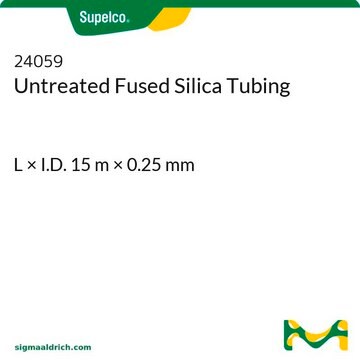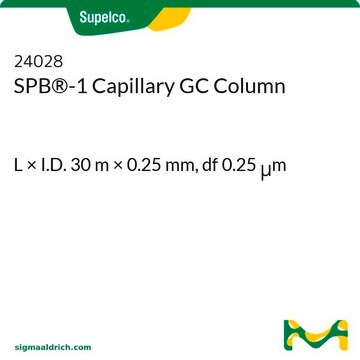24077
SUPELCOWAX 10
L × I.D. 15 m × 0.25 mm, df 0.25 μm
Synonyme(s) :
Supelcowax 10, 15 M 0,25 UM. 0,25 MM
About This Item
Produits recommandés
Matériaux
fused silica
Niveau de qualité
Agence
OSHA 52,80
meets requirements for USP G16
Paramètres
35-280 °C temperature (isothermal or programmed)
Valeur bêta
250
df
0.25 μm
Technique(s)
gas chromatography (GC): suitable
L × D.I.
15 m × 0.25 mm
Groupe de la matrice active
Bonded; poly(ethylene glycol) phase
Application(s)
agriculture
chemicals and industrial polymers
cleaning products
cosmetics
flavors and fragrances
food and beverages
industrial hygiene
personal care
petroleum
pharmaceutical (small molecule)
Type de colonne
capillary polar
Vous recherchez des produits similaires ? Visite Guide de comparaison des produits
Description générale
USP Code: This column meets USP G16 requirements.
Phase:
- Bonded
- Poly(ethylene glycol)
- ≤0.32 mm I.D.: 35 °C to 280 °C (isothermal or programmed)
- ≥0.53 mm I.D., <2 μm: 35 °C to 280 °C (isothermal or programmed)
- ≥0.53 mm I.D., ≥2 μm: 35 °C to 250 °C (isothermal or programmed)
Application
Autres remarques
Informations légales
Faites votre choix parmi les versions les plus récentes :
Déjà en possession de ce produit ?
Retrouvez la documentation relative aux produits que vous avez récemment achetés dans la Bibliothèque de documents.
Notre équipe de scientifiques dispose d'une expérience dans tous les secteurs de la recherche, notamment en sciences de la vie, science des matériaux, synthèse chimique, chromatographie, analyse et dans de nombreux autres domaines..
Contacter notre Service technique


